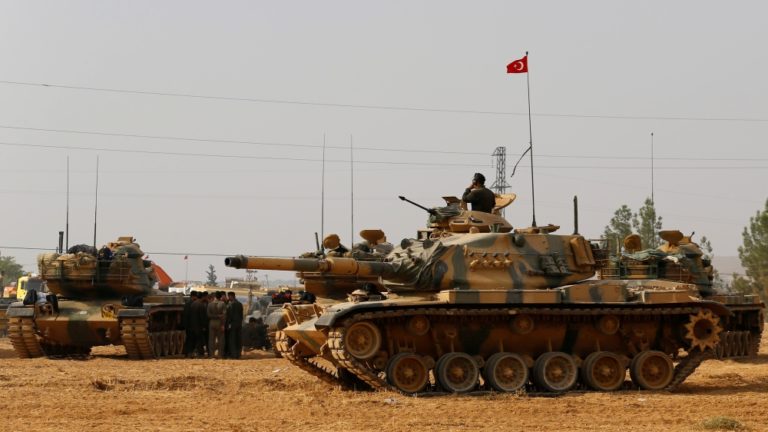The loss of Istanbul to an opposition candidate in Turkey’s recent local elections was hyped up by many American commentators, especially pro-Israeli analysts, as marking the end of President Recep Erdogan’s 17-year long dominance in the country’s politics ever since his stunning victory in the 2002 general election.
The main agenda behind the doomsday predictions and the ‘psywar’ was to rattle Erdogan, soften him up and force him to jettison his staunchly anti-Zionist policy and his open support for the Palestinian cause, his proximity to Russian President Vladimir Putin — overall, his independent foreign policies. In particular, Washington targeted Erdogan’s decision to purchase the S-400 missile system from Russia.
However, Erdogan has sprang a surprise on the US by going ahead with the S-400 deal, openly defying the threat of sanctions. The delivery of the missile began five days ago and almost every day, Russian military transport aircraft are landing in Ankara ferrying consignments related to the S-400 ABM system.

Not only that, Erdogan is giving the Americans the middle finger by announcing that President Trump has told him in a private conversation in Osaka on the margins of the recent G20 summit that there isn’t going to be any sanctions, no matter what the US officials would be saying.
According to Bloomberg, Trump’s team has settled on a sanctions package and plans to announce it later this week once POTUS approves it. On the other hand, Erdogan said on Sunday that Trump has the authority to waive sanctions on Turkey and “since this is the case, it is Trump who needs to find the middle ground.”
But US Secretary of State Mike Pompeo firmly told the Washington Post in an interview published late on Sunday that “the law requires that there be sanctions and I’m confident that we will comply with the law and President Trump will comply with the law”.
It seems Erdogan is playing chicken. He disclosed in the weekend that the Russian system will be deployed and ready only by April next year. At the same time, he has also mentioned the possibility of ‘co-production’ of the Russian system in Turkey. In his words, “The S-400s are the strongest defence system against those who want to attack our country. God willing, we are doing this as a joint investment with Russia, and will continue to do so.”
Certainly, Erdogan doesn’t look as if he is cowed down by the defeat of his party’s candidate in the mayoral election in Istanbul. He is unperturbed by the propaganda against him by the US media and think tankers. Nor is his behaviour showing as if he is on the run.
All factors taken into account, it cannot be ruled out that Trump may waive or postpone the sanctions against Turkey, a country where the US president has significant business interests. What can be predicted with certainty is that Erdogan will react strongly to any US sanctions.
Erdogan has several options on the table — ranging from evicting the US military from its bases in Turkey (which of course will entail the removal of the 60 nuclear bombs as well) to the launch of the much talked about military operations against the Kurdish militia in northern Syria.

In the latter case, if Turkey decimates the Kurdish fighters, the US will be left with no proxies / allies in Syria and any form of continued American military presence in the Euphrates region will become difficult to maintain. That of course will hit Israeli interests very badly. The Pentagon is already nervous.
All the evidence suggests that Erdogan has made a strategic decision that Turkey’s future lies in Eurasian integration and the current sparring is a shadow play.
All the evidence suggests that Erdogan has made a strategic decision that Turkey’s future lies in Eurasian integration and the current sparring is a shadow play. His recent meeting with Chinese President Xi Jinping soon after the G20 summit on Osaka — and in Beijing — and his strong endorsement of Chinese policies on the Uighur problem can only be seen as a deliberate, well-calculated move to ensure that there are no contradictions in Turkey’s gravitation to the East.
In particular, Erdogan visualises that China’s Belt and Road presents just the alternative he needs to revive the Turkish economy and withstand western pressure. The Chinese Communist Party tabloid Global Times commented that Erdogan’s meeting with the Chinese leadership “marked political consensus between China and Turkey on a deeper level of understanding. China’s policies on Xinjiang are part of its internal affairs that no other country has a right to interfere with. Erdogan’s remarks on the Xinjiang question are the premise and guarantee for upgrade of bilateral cooperation.”

In an op-ed in the Global Times on the eve of his arrival in Beijing, Erdogan wrote, “Turkey shares China’s vision when it comes to serving world peace, preserving global security and stability, promoting multilateralism, and upholding the principle of free trade. The world seeks a new, multipolar balance today. The need for a new international order, which will serve the interests of all humanity, is crystal clear. Turkey and China, the world’s most ancient civilisations, have a responsibility to contribute to building this new system.”
Clearly, Erdogan couldn’t care less anymore about US sanctions. Read a commentary by Xinhua entitled Erdogan’s visit sign of aligned Turkish-Chinese interests: experts.
Cover photo: Components of S-400 missile defense system are unloaded from a Russian plane at Akinci Air Base, near Ankara, July 12, 2019.






